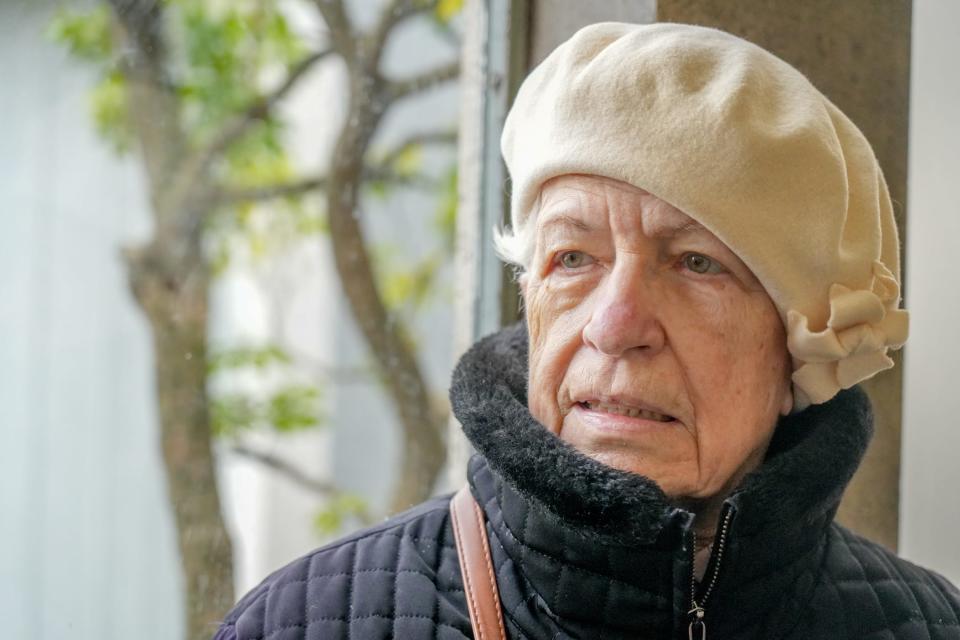RI presidential primaries: Beyond easy victories for Biden and Trump, what happened?
- Oops!Something went wrong.Please try again later.
- Oops!Something went wrong.Please try again later.
PROVIDENCE – Rhode Island voters – about 38,000 of them at least – endorsed the presumptive nominees for president Tuesday in low-key primaries held long after any doubt had ended about who would top the major party tickets in November.
Democrat Joe Biden and Republican Donald Trump, the only candidates campaigning for the office, took 81% and 84% of the vote respectively over candidates who had already waved the white flag.
The only questions were over the margins, the protest vote and which local pols will get to be delegates at their parties' national conventions. Here are some takeaways:
How did 'uncommitted' do?
The biggest drama of the night centered on how many Rhode Islanders would make it to the polls to vote for ... no one.
As in many states, many progressive Rhode Islanders voted "uncommitted" in the Democratic primary in protest of Biden's support for the Israeli invasion of Gaza.
In Rhode Island, 3,766 people voted uncommitted, or 14.5%, according to unofficial results from the state Board of Elections. Dean Phillips, the only candidate on the Democratic ballot other than Biden, got 2.5%.
In Providence, home to large student and leftist populations, 29% voted uncommitted.
The list of Democrats who said they voted uncommitted included state Senators Sam Bell and Tiara Mack, former state Sen. Jeanine Calkin, former state Rep. and congressional candidate Aaron Regunberg, Providence City Councilman Miguel Sanchez and former state Sen. and lieutenant governor candidate Cynthia Mendes.
an uncommitted vote in a Democratic primary is NOT a vote for trump, it’s a vote to encourage president biden to significantly change his unconditional support of a genocide that is being funded with our tax dollars.
don’t let establishment loyalist’s try to tell you otherwise. https://t.co/j6hjXHBrSP— Miguel Angel Sanchez (@MSanchezPVD) April 2, 2024
A Vote Uncommitted RI coalition led in part by the Rhode Island Chapter of the Democratic Socialists of America "contacted over 12,000 voters by text, distributed flyers throughout neighborhoods and at houses of worship and stood outside polling locations to support an 'uncommitted' vote," a release from the DSA said Wednesday.
Like low turnout in uncompetitive primaries, a large uncommitted vote is not that unusual. Four years ago 1,861 people voted uncommitted, more than went for fourth place Andrew Yang and fifth place Tulsi Gabbard combined.
In 2012, the last primary with a Democratic incumbent, 16.8% voted uncommitted against Obama.
"President Biden has dedicated himself to equality for all Americans and supporting American families – whether it be for education, health care, jobs, a clean environment, or our rights," Rhode Island Democratic Party Chairwoman Liz Beretta-Perik said in a statement. "President Biden is an ardent supporter of Rhode Island and will continue to support us when he is reelected for a second four year term."
Perik declined to answer questions Wednesday about whether party bylaws suggested any of the Rhode Island delegates to the Democratic National Convention would go to "uncommitted."
Haley breaks 10%
While internal displeasure with Biden manifested as uncommitted votes, GOP unrest with Trump mostly found a home in votes for Nikki Haley of South Carolina.
Haley took 10.5% of the Republican vote, a total that could see her get one or more of the 35 Rhode Island delegates going to the Republican National Convention in Milwaukee.
Ron DeSantis got 1.4%, Chris Christie 1.2% and Vivek Ramaswamy 0.3%.
How many Rhode Islanders voted?
With all precincts reporting Wednesday morning, turnout looked to be a little more than 5% of the state's 723,187 registered voters.
That's significantly lower than the 15% turnout in 2020, when 123,875 people voted in a primary moved to June because of the COVID pandemic. (Biden beat Bernie Sanders and Trump beat Bill Weld that year.)
In 2016, high interest in the Democratic primary drove 25% turnout on 187,291 votes when Sanders beat Hillary Clinton and Trump bested John Kasich.
But Tuesday's primary turnout wasn't abnormal for a year with a Democratic incumbent. In the 2012 primaries featuring Barack Obama and Mitt Romney, 23,200 Rhode Islanders voted, or 3.2%.

How did Rhode Island compare to Massachusetts?
The Bay State presidential primary was March 5.
Biden got 83% of the vote in Massachusetts, with 9.3% voting no preference. (The uncommitted movement hadn't gained much momentum nationally at that point.)
Trump only took 60% of the vote in Massachusetts to 37% for Haley, who was still campaigning at that point.
Connecticut also voted Tuesday, and Trump beat Haley 78% to 14% there. Biden had 85% in Connecticut to 11% uncommitted.
Who will go to the Democratic convention?
The real-world stakes of the Rhode Island presidential primary were low, but some big names were on the ballot. A handful of well known Ocean State Democrats ran as Biden delegates, including Providence Mayor Brett Smiley, Pawtucket Mayor Don Grebien, Central Falls Mayor Maria Rivera, Senate Majority Leader Ryan Pearson and Sen. Sandra Cano.
Smiley was the top vote-getter among Biden delegates in the 1st Congressional District, followed by Cano and Rivera.
Pearson and William Foulkes, husband of 2022 gubernatorial candidate Helena Foulkes, appeared not to have made the top seven to qualify.
Who will go to the Republican convention?
On the GOP side, the top vote getter among a dozen candidates running to be Trump delegates in the 1st District was Paul Carroll.
In 2nd District, the top vote getter was Lacey McGreevy. The second-highest total for Trump delegates went to former state Rep. Justin Price, who attended the Jan. 6, 2021 Trump rally in Washington.
This article originally appeared on The Providence Journal: RI's 2024 presidential primaries showed much more than Biden, Trump wins

